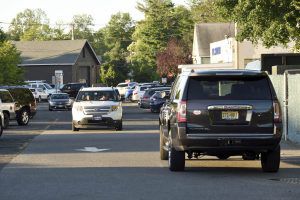As most of us know, the current Task Force proposes to permanently lease residential neighborhood street parking to for-profit enterprises in the Witherspoon-Jackson and “tree street” neighborhoods, and all over Princeton – and also charge homeowners a fee to park on their own streets.
Any home within a half-mile of a business address may be impacted.
But studies show that even if this proposal were only enacted in selected neighborhoods (i.e. those that presently have strongly detrimental inequitable parking issues), the proposed “solution” would end up developing into a worse situation for everyone later on, and of course it would also create a very much worse situation for everyone living in many other neighborhoods in Princeton, right from the beginning.
Parking on the tree streets, and in the Witherspoon-Jackson neighborhood, has been an issue for years, with neighbors struggling to find parking spaces for their own vehicles and those of their guests, workers and home aides. Some people living in these already suffering neighborhoods believe that the solution to their ongoing problems is to spread the suffering to others, as the current Task Force proposal would do. “If other neighborhoods bore the burden too, we would be better off.” We urge you to reject that logic and think holistically.
A business parking plan of any kind, in any neighborhood, would make the existing situation worse for everyone, not better. Those businesses who already pay for employees to park in nearby paid lots will empty those cars into the neighborhoods to take advantage of the council’s below-market scheme. Moreover, studies confirm that when a commuter parking subsidy is offered, more people drive (and fewer ride transit), creating even more parking demand and congestion than exists today, not less. Existing federal commuter parking subsidies have been found to be inequitable, and environmentally regressive.
Instead, Task Force and council members must follow the lead of other municipalities in protecting the tree streets, the Witherspoon-Jackson neighborhood, and all other residential neighborhoods in Princeton, with residential parking zones. A residential parking zone on residential streets would protect them from the many detrimental impacts of commercial parking “spillover,” and business employee parking could be located instead at satellite parking lots with shuttle bus service to and from.
This would be better in every way for everyone: residents, businesses, employees and shoppers – also less expensive, and a lot less complicated. Capacity in Princeton already exists for this; read the study at https://sensiblestreets.org/educate-yourself
Alice Artzt
Princeton

